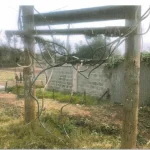The Kenyan government has initiated talks with the World Bank and the European Union (EU) to secure funding for a national program aimed at removing asbestos roofing materials from schools, hospitals, and government buildings across the country. This move comes after health experts raised fresh concerns about the long-term exposure to asbestos fibers, which have been directly linked to cancer and respiratory diseases such as mesothelioma.
Asbestos, once a popular roofing material due to its durability and affordability, has now become a public health hazard. According to the Ministry of Health, thousands of public institutions across Kenya still have aging asbestos roofs that pose significant risks, especially in areas where roofing sheets have started to crumble and release harmful fibers into the air.
The government’s plan seeks to phase out these roofs in collaboration with development partners like the World Bank and the European Union, who have previously supported Kenya’s infrastructure and environmental health projects. If successful, this program could be one of the largest public health and housing safety initiatives in Kenya’s history.
Speaking during a recent meeting in Nairobi, Environment Cabinet Secretary noted that the government is prioritizing institutions with the highest exposure risks. “Our goal is to ensure that no child, teacher, or healthcare worker is exposed to asbestos-related illnesses,” she stated.
Public health organizations have welcomed the move, emphasizing that the removal process must follow international safety standards to prevent contamination during the demolition phase. Experts recommend safe disposal of asbestos waste in lined and isolated landfills to protect the environment.
In addition to improving public health, the initiative could also create thousands of jobs in the construction and environmental management sectors, as contractors will be hired to remove, transport, and replace the roofs with safer materials such as metal sheets or eco-friendly alternatives.
For many Kenyans, especially those living in older estates and public housing, this project is a sign of hope. It highlights the government’s growing commitment to environmental safety, sustainable housing, and long-term health protection.
As the talks with the World Bank and EU continue, citizens are hopeful that the initiative will not only rid the nation of toxic asbestos but also pave the way for a cleaner and healthier future.










